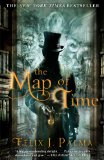Summary | Excerpt | Reviews | Beyond the Book | Readalikes | Genres & Themes | Author Bio

A Novel
by Felix J. Palma
He left off his uncomfortable broodings when he glimpsed a familiar carriage coming out of the fog towards him from the opposite direction. It was the Winslow family carriage, and the bundled-up figure on the perch was almost certainly Edward Rush, one of their coachmen. To judge from the way he slowed the horses, Rush appeared to have recognized him, too. Harold nodded a silent greeting to his colleague, before directing his gaze at the occupant of the carriage. For a split second, he and young Charles Winslow stared solemnly at one another. They did not say a word.
"Faster, Edward," Charles ordered his driver, tapping the roof of the carriage frantically with the knob of his cane.
Harold watched with relief as the carriage vanished once more into the fog in the direction of the Miller's Court flats. He was not needed now. He only hoped that young Winslow arrived in time. He would have liked to stay and see how the affair ended, but he had an order to carry out - although he fancied it had been given to him by a dead man - and so he urged the horses on once more and found his way out of that dreaded neighborhood where life (I apologize for the repetition, but the same thought did occur to Harold twice) was not worth thruppence. Admittedly, the expression sums up the peculiarity of the neighborhood very accurately, and we probably could not hope for a more profound appraisal from a coachman. However, despite having a life worthy of being recounted - as are all lives upon close scrutiny - the coachman Harold Barker is not a relevant character in this story. Others may choose to write about it and will no doubt find plenty of material to endow it with the emotion every good story requires - the time he met Rebecca, his wife, or the hilarious incident involving a ferret and a rake - but that is not our purpose here.
And so let us leave Harold, whose reappearance at some point in this tale I cannot vouch for, because a whole host of characters are going to pass through it and I can't be expected to remember every one of their faces. Let us return to Andrew, who at this very moment is crossing the arched entrance to Miller's Court and walking up the muddy stone path trying to find number thirteen while he rummages in his coat pocket for the key. After stumbling around in the dark for a few moments he found the room, pausing before the door with an attitude which anybody able to see him from one of the neighboring windows would have taken to be incongruous reverence. But for Andrew that room was infinitely more than some wretched lair where people who hadn't a penny to their name took refuge. He had not been back there since that fateful night, although he had paid to keep everything exactly as it had been, exactly as it still was inside his head. Every month for the past eight years he had sent one of his servants to pay the rent for the little room so that nobody would be able to live there, because if he ever went back, he did not want to find traces of anyone but Marie. The few pennies for the rent were a drop in the ocean for him, and Mr. McCarthy had been delighted that a wealthy gentleman and obvious rake should want to rent that wretched dwelling indefinitely, for after what had taken place within its four walls he very much doubted anybody would be brave enough to sleep there. Andrew realized now that deep down he had always known he would come back, that the ceremony he was about to perform could not have been carried out anywhere else.
He opened the door and cast a mournful gaze around the room. It was a tiny space, scarcely more sophisticated than a shack, with flaking walls and a few sticks of battered furniture including a dilapidated bed, a grimy mirror, a crumbling fireplace, and a couple of chairs which looked as if they might fall apart if a fly landed on them. He felt a renewed sense of amazement that life could actually take place in somewhere like this. And yet, had he not known more happiness in that room than in the luxurious setting of the Harrington mansion? If, as he had read somewhere, every man's paradise was in a different place, his was undoubtedly here, a place he had reached guided by a map not charting rivers or valleys but kisses and caresses.
Excerpted from The Map of Time by Felix J Palma. Copyright © 2011 by Felix J Palma. Excerpted by permission of Atria Books. All rights reserved. No part of this excerpt may be reproduced or reprinted without permission in writing from the publisher.




He who opens a door, closes a prison
Click Here to find out who said this, as well as discovering other famous literary quotes!
Your guide toexceptional books
BookBrowse seeks out and recommends the best in contemporary fiction and nonfiction—books that not only engage and entertain but also deepen our understanding of ourselves and the world around us.